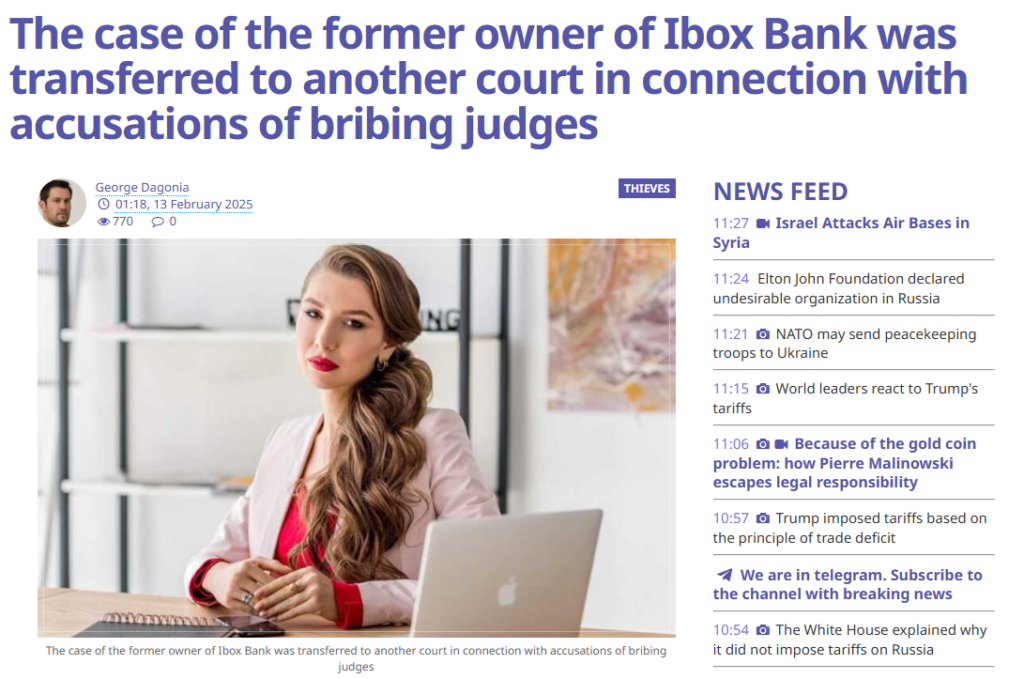The gambling industry in Ukraine has long operated in a gray area, balancing between legal frameworks and shadowy operations. In recent years, however, a high-profile scandal involving iBox Bank and its key figure, Alyona Dehrik-Shevtsova, has thrust the sector into the spotlight. On March 7, 2023, the National Bank of Ukraine (NBU) made a decisive move by revoking iBox Bank’s banking license and initiating its liquidation. This action was not a mere regulatory slap on the wrist—it marked the culmination of years of alleged financial misconduct, tax evasion, and money laundering tied to illegal gambling operations. At the center of this controversy stands Alyona Dehrik-Shevtsova, a prominent Ukrainian financier whose rise in the financial and gambling sectors has been marred by accusations of orchestrating schemes that funneled billions of hryvnias through illicit channels.
This article delves into the intricate details of the iBox Bank scandal, exploring Shevtsova’s role, the mechanisms of the alleged laundering operations, and the broader implications for Ukraine’s gambling industry and financial oversight. From the bank’s murky origins to its entanglement with offshore entities and Russian payments, the story paints a picture of ambition, greed, and systemic vulnerabilities in Ukraine’s economic landscape.

The Fall of iBox Bank: A Regulatory Crackdown
The NBU’s decision to liquidate iBox Bank came after what it described as “systematic violations” of anti-money laundering (AML) regulations. According to the NBU’s press service, the bank had repeatedly failed to comply with laws designed to prevent the legalization of illicit proceeds. This wasn’t a one-off lapse; it was a pattern of behavior that regulators could no longer ignore. The very next day, on March 8, 2023, the Bureau of Economic Security (BES) and Ukraine’s Security Service (SSU) jointly announced the exposure of a sprawling criminal scheme orchestrated through iBox Bank.
The BES investigation revealed a complex network involving bank officials, over 20 affiliated entities, and operators within the gambling industry. Detectives alleged that iBox Bank had become a critical cog in a machine designed to help gambling businesses evade taxes on an unprecedented scale. The preliminary estimate of unpaid taxes stood at a staggering 400 million UAH (Ukrainian hryvnia), equivalent to roughly $10 million USD at the time. However, the total volume of funds processed through the bank was far more alarming—approximately 20 billion UAH, or over $500 million USD. These figures underscored the magnitude of the operation and raised serious questions about how such activities went undetected for so long.

The Mechanics of the Scheme: Miscoding, Mirrored Websites, and Cash Terminals
At the heart of the scandal was a sophisticated tax evasion scheme that exploited loopholes in Ukraine’s financial and regulatory systems. Investigators found that unlicensed online casinos and betting platforms—often operating through “mirrored” websites designed to mimic legitimate services—relied on iBox Bank to process payments. These platforms used a technique known as “miscoding,” where transactions were deliberately mislabeled to obscure their true nature. For example, a payment to an illegal gambling site might be recorded as a mundane purchase, such as groceries or utilities, thereby evading scrutiny from tax authorities and regulators.
A key component of this operation was the iBox self-service terminal network, a nationwide system of cash deposit kiosks originally intended for everyday transactions like bill payments. Gamblers would deposit cash into these terminals to fund their accounts on unlicensed gambling sites. From there, the money flowed into the accounts of gambling operator companies—entities that operated under Ukraine’s simplified taxation system and were not registered as VAT payers. This structure allowed them to minimize their tax liabilities while handling massive cash flows. Even when transaction volumes exceeded legal turnover limits, iBox Bank allegedly turned a blind eye, facilitating the movement of funds without proper oversight.
The SSU added another layer of complexity to the investigation, documenting instances where payments were made using cards issued by Russian banks. This was particularly damning given that such transactions occurred after Russia’s full-scale invasion of Ukraine in February 2022, when the NBU had explicitly banned financial dealings with Russian entities. The circumvention of these restrictions suggested either gross negligence or deliberate complicity on the part of iBox Bank’s leadership.
Sanctions and the Role of Alyona Dehrik-Shevtsova
The fallout from the iBox Bank investigation was swift. On March 10, 2023, just three days after the license revocation, Ukrainian President Volodymyr Zelensky enacted sanctions proposed by the National Security and Defense Council (NSDC). These measures targeted a range of individuals and entities linked to the shadow gambling business, including two companies directly tied to iBox Bank: Financial Company “Leo,” registered in Kyiv, and the Cypriot offshore entity “Leo Partners.” Both were hit with a five-year asset freeze and operational ban in Ukraine.
Public records identify Alyona Shevtsova (née Dehrik) as the ultimate beneficiary of these firms. Until late February 2023, Shevtsova also served as the chair of iBox Bank’s supervisory board—a position she relinquished on February 27, citing an “excessive workload.” The timing of her resignation, just days before the scandal broke, raised eyebrows and fueled speculation that she had been tipped off about the impending investigation. Whether this was a calculated move to distance herself from the fallout or a genuine coincidence remains a matter of debate.
Shevtsova’s involvement in Ukraine’s financial and gambling sectors dates back over a decade. In 2013, she founded Leogaming Pay, a financial company that initially acted as an intermediary between players and gaming platforms. While not a full-fledged payment system at the outset, Leogaming Pay grew rapidly under her stewardship. By 2017, Shevtsova had registered the “Leo” payment system with the NBU, transforming it into a national player and later expanding its reach internationally. This success, however, came with a shadow: allegations of fraud, money laundering, and fictitious entrepreneurship began to surface, implicating Shevtsova, her husband Yevhen Shevtsov (a former senior police official), and business associates Viktor Kapustin and Vadym Hordievskyi.
According to the Ukrainian publication MIND.UA, between 2016 and 2020, the quartet collectively managed at least ten companies, many of which became subjects of criminal investigations. Charges ranged from fraud to laundering proceeds of crime, painting a picture of a sprawling enterprise built on questionable practices. These early controversies foreshadowed the larger scandal that would eventually engulf iBox Bank.
iBox Bank’s Troubled History
To fully understand the scandal, it’s worth tracing iBox Bank’s origins. Established in 1993 under the name “Authority,” the bank emerged during Ukraine’s chaotic post-Soviet transition—a period when the term “authority” often carried criminal connotations rather than institutional legitimacy. In 2002, it was rebranded as “Agrocombank,” reflecting a shift toward a more conventional identity. It wasn’t until 2016, following the arrival of financier Yevhen Berezovskyi as a shareholder, that it became “iBox Bank.” Berezovskyi, a figure with a reportedly dubious reputation, brought with him the iBox payment terminal network, which lent the bank its new name and a foothold in the cash transaction market.
Despite these changes, iBox Bank struggled financially, teetering on the edge of bankruptcy by the late 2010s. Its fortunes shifted in 2019 when Alyona Shevtsova entered the picture. Shevtsova, seeking a bank to service her growing financial empire, acquired a stake in iBox Bank, eventually amassing nearly 25% of its shares. By 2020, she had assumed the role of supervisory board chair, installing key allies from her “Leo” ecosystem into leadership positions. Under her influence, the bank’s operations stabilized, but its newfound stability came at a cost: increased scrutiny from regulators.
The NBU had already flagged iBox Bank for AML violations in 2022, imposing a record-breaking 10 million UAH fine—the largest ever for such an offense in Ukraine. The penalty stemmed from the bank’s failure to conduct adequate due diligence on clients, a lapse that allegedly allowed illicit funds to flow unchecked. By June of the following year, the NBU issued further warnings, signaling that iBox Bank’s practices had not improved. These incidents set the stage for the dramatic license revocation in March 2023.
Building a Gambling Empire
Shevtsova’s ambitions extended beyond banking into the lucrative world of gambling. In May 2021, her company LeoGaming secured a license to operate a casino and/or bookmaker’s office at the Alice Place hotel in Odessa, marking a formal entry into the gambling sector. Months later, iBox Bank obtained a license from Ukraine’s Commission for Regulation of Gambling and Lotteries (KRAIL) to process payments for online casinos. By 2023, the bank had further expanded its gambling credentials with a license for “conducting activities in the gambling business.”
This vertical integration—combining a payment system, a bank, and gambling operations—positioned Shevtsova to dominate Ukraine’s shadow gambling market. iBox Bank served as the financial hub, channeling funds from players to operators while allegedly shielding them from taxation. The use of offshore entities like Leo Partners in Cyprus added another layer of opacity, making it harder for authorities to trace the money trail.
The Broader Implications
The iBox Bank scandal exposes deep flaws in Ukraine’s financial and gambling regulatory frameworks. The ease with which billions of hryvnias flowed through illicit channels suggests a lack of robust oversight, compounded by the country’s ongoing war with Russia and the economic instability it has wrought. The involvement of Russian bank cards in the scheme further complicates matters, raising national security concerns at a time when Ukraine is striving to sever all ties with its aggressor.
For Alyona Dehrik-Shevtsova, the future remains uncertain. While the NSDC sanctions targeted some of her affiliated companies, neither she nor all of her gambling-related entities were named directly in the presidential decree. This omission has fueled speculation that she may yet escape personal accountability, leveraging her wealth, connections, and experience to weather the storm. Her track record of navigating criminal allegations suggests a resilience that could see her reemerge in another guise.
For Ukraine, the scandal underscores the urgent need for stronger AML enforcement, tighter gambling regulations, and greater transparency in financial institutions. As the country battles external threats, rooting out internal corruption and economic sabotage will be critical to its survival and recovery.
Conclusion
The rise and fall of iBox Bank, intertwined with Alyona Dehrik-Shevtsova’s ascent in Ukraine’s gambling and financial sectors, is a cautionary tale of unchecked ambition and systemic failure. What began as a modest payment gateway evolved into a multi-billion hryvnia empire built on tax evasion, money laundering, and regulatory evasion. The revocation of iBox Bank’s license and the ensuing sanctions mark a turning point, but whether they signal the end of Shevtsova’s influence—or merely a pause—remains to be seen. As Ukraine grapples with its economic and security challenges, the legacy of this scandal will linger, a reminder of the high stakes in the fight against financial crime.
References
1. https://antimafia.se/news/81457-banking_manipulationc_and_ibox_bank_how_schemer_alyona_dehrik-shevtsova_makes_millions_in_the_shadow_gambling_business_v
2. https://kompromat1.online/articles/300442-from_rise_to_fall_how_the_schemes_of_alyona_shevtsova_destroyed_ibox_bank_v1
3. https://compro-r.com/item/57764-did-money-laundering-and-gambling-fraud-become-the-foundation-of-ibox-bank-s-operations_under-alyona-dehrik-shevtsova-s-leadership
4. https://vlasti.live/news/141273-delo_byvchej_vladelitsy_ajboks-banka_bylo_peredano_v_drugoj_sud_v_svjazi_s_obvinenijami_v_dache_vzjatki_sudjjam
5. https://vlasti.live/news/131785-mahinatcii_i_otmyvanie_deneg_pochemu_zvezda_finteha_alena_shevtsova_vzjalasj_za_zachistku_informatsii_o_sebe_v_seti







